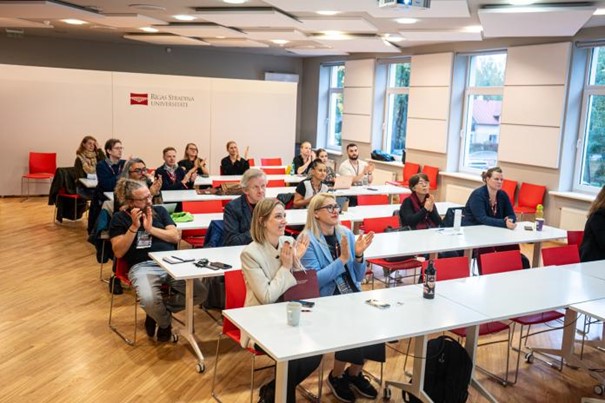
Attendees of the Getaway Conference in Riga
Working Group on Migration and Mobility
The WG reports on the conference “The Getaway Conference: Mobilities, Societies, the State and Detoxification”, held in Riga, Latvia on October 10th – 11th, 2024.
Getaway Conference at Rīga Stradiņš University
Rīga Stradiņš University (RSU) hosted the international conference The Getaway Conference: Mobilities, Societies, the State and Detoxification on 10 and 11 October 2024. It was organised by researchers from the RSU Social Sciences Research Centre as part of the project (R)E-TIES: Managing mobility and human relations in digitally saturated worlds in collaboration with the FLPP project Removing Ties. The International Society for Ethnology and Folklore (SIEF) also supported the event. Ieva Puzo, who is a RSU researcher and the head of the Social Sciences Research Centre at RSU, and Christian Ritter, who acts as senior lecturer in the department of geography, media and communication at Karlstad University, co-chair SIEF’s Mobility and Migration Working Group. As Dr. Puzo explained in her opening speech, the conference call invited researchers from different social science perspectives to think about disentangling and distancing in different forms - for example, from places, processes, or human relationships. The conference theme thus outlined an innovative angle in mobility research, with a particular focus on the cross-border movement of highly skilled professionals.

Attendees of the Getaway Conference in Riga
The conference was opened by the internationally recognized mibility researcher, Senior Professor Louise Ryan, who teaches sociology at London Metropolitan University and acts as the director of the Global Diversities and Inequalities Research Centre. Professor Ryan delivered a keynote titled You need a network reflecting on how highly qualified refugees rebuild social networks to convert cultural capital and reclaim professional identities, which was partially based on her latest book Social Networks and Migration (2023). In her presentation, she explored the forms of discrimination that highly qualified refugees face when aiming to establish new professional contacts in host countries. Her talk provided fresh perspectives on the role of social capital in contemporary career rebuilding in the UK. The two-day conference was attended by about 30 mobility researchers and primarily facilitated knowledge exchanges among PhD students and early career researchers.




